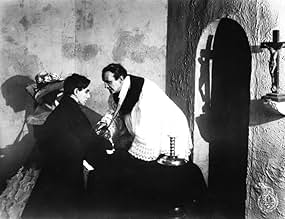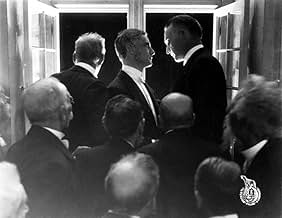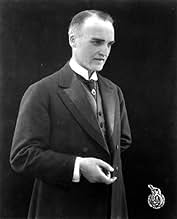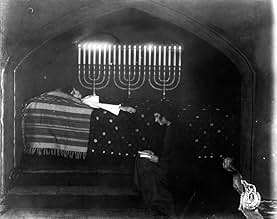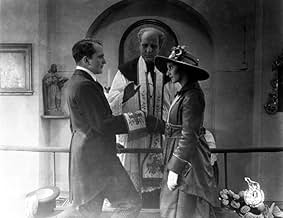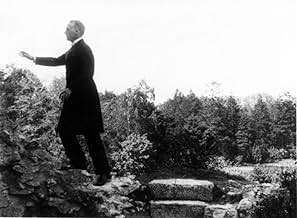AVALIAÇÃO DA IMDb
6,6/10
1,1 mil
SUA AVALIAÇÃO
O juiz de uma cidade dinamarquesa vê sua filha ilegítima enfrentando um julgamento pelo assassinato de seu filho recém-nascido e tem certeza de que ela será condenada à morte.O juiz de uma cidade dinamarquesa vê sua filha ilegítima enfrentando um julgamento pelo assassinato de seu filho recém-nascido e tem certeza de que ela será condenada à morte.O juiz de uma cidade dinamarquesa vê sua filha ilegítima enfrentando um julgamento pelo assassinato de seu filho recém-nascido e tem certeza de que ela será condenada à morte.
- Direção
- Roteiristas
- Artistas
Carl Walther Meyer
- Rigsherre von Sendlingen
- (as Carl Meyer)
- Direção
- Roteiristas
- Elenco e equipe completos
- Produção, bilheteria e muito mais no IMDbPro
Avaliações em destaque
It did seem to be a good film but i had trouble reading quite a few of the captions. The writing was too small and because of this it was hard to follow the storyline.
This film by Carl Dreyer is titled 'The President' in the old-fashioned European sense of the word 'president': the title character is the presiding official of a European town; not quite the mayor, nor quite the chief magistrate. Like its title, this entire film is very much a product of the fading days of imperial Europe. The film's premise takes it for granted that aristocratic noblemen are somehow innately different from the common folk, with a different set of priorities, a different set of duties, and a different form of justice.
The film is set in 19th-century Denmark. The main plot is some hoo-ha about a greying blue-blood (Halvard Hoff) who must preside over the trial and sentence of a young governess (Olga Raphael-Linden) accused of murdering the child in her charge. The governess pleads guilty, but for some reason she's going to be put on trial anyway. (I know nothing about 19th-century Danish law; would a defendant who pleads guilty to a capital offence be made to stand trial?) The president abruptly learns that the governess is his own daughter, born of a tryst with a working-class woman whom he didn't marry due to their social disparity. Naturally, because this total stranger is his own daughter he must now intercede. What follows is mostly deepest bathos.
The action of this sprawling movie takes place over three generations. Two of the actors in this film (Hoff and Elith Pio) each play their characters at two radically different ages; unfortunately, the old-age makeup on these two young actors is very unconvincing. Also unconvincing is the hairpiece worn by Richard Christensen (the best actor in this film) as the governess's defence advocate. I was distressed that Christensen bears a striking resemblance to Michael Palin. Talking of makeup: the governess wears lip rouge in her death cell.
Whoever handled the set dressing on this movie should have cut down on the caffeine: one character's home is decorated with dozens of silhouette portraits, while another character's home is festooned with miniatures arranged in geometric patterns. The keys for the cells in the local prison are hung on a wall-rack shaped like a bat; it looks like it would have been more appropriate in Dreyer's film 'Vampyr'. One shot in this movie, depicting a servant seen only in shadow, reminded me of a famous shot in 'Vampyr'.
In all the long length of 'The President', Dreyer's camera hardly ever moves and always does so clumsily. Fortunately, Dreyer's static camera gives us some strikingly beautiful compositions. All of his exteriors are exquisitely framed and lighted. (I wonder if he used reflectors.) A few brief sequences are rather obviously shot day-for-night. I was impressed by one shot when lovers meet on a bridge; we see their reflections in the water rather than the lovers themselves.
There are a few weird lapses here. One character wears spectacles in medium-long shot, then Dreyer cuts to him in close-up and the spectacles are gone. The president's cook carries live terriers in a closed satchel with no airholes, to no ill effect. The cook is played by Fanny Petersen, who strongly resembles Beryl Mercer, one of the most annoying actresses in film history.
'The President' has many flaws, most notably a turgid and overly complicated storyline. However, Dreyer's directorial skill is manifest here, and most of his actors give good performances. I'll rate this deeply old-fashioned movie 6 out of 10.
The film is set in 19th-century Denmark. The main plot is some hoo-ha about a greying blue-blood (Halvard Hoff) who must preside over the trial and sentence of a young governess (Olga Raphael-Linden) accused of murdering the child in her charge. The governess pleads guilty, but for some reason she's going to be put on trial anyway. (I know nothing about 19th-century Danish law; would a defendant who pleads guilty to a capital offence be made to stand trial?) The president abruptly learns that the governess is his own daughter, born of a tryst with a working-class woman whom he didn't marry due to their social disparity. Naturally, because this total stranger is his own daughter he must now intercede. What follows is mostly deepest bathos.
The action of this sprawling movie takes place over three generations. Two of the actors in this film (Hoff and Elith Pio) each play their characters at two radically different ages; unfortunately, the old-age makeup on these two young actors is very unconvincing. Also unconvincing is the hairpiece worn by Richard Christensen (the best actor in this film) as the governess's defence advocate. I was distressed that Christensen bears a striking resemblance to Michael Palin. Talking of makeup: the governess wears lip rouge in her death cell.
Whoever handled the set dressing on this movie should have cut down on the caffeine: one character's home is decorated with dozens of silhouette portraits, while another character's home is festooned with miniatures arranged in geometric patterns. The keys for the cells in the local prison are hung on a wall-rack shaped like a bat; it looks like it would have been more appropriate in Dreyer's film 'Vampyr'. One shot in this movie, depicting a servant seen only in shadow, reminded me of a famous shot in 'Vampyr'.
In all the long length of 'The President', Dreyer's camera hardly ever moves and always does so clumsily. Fortunately, Dreyer's static camera gives us some strikingly beautiful compositions. All of his exteriors are exquisitely framed and lighted. (I wonder if he used reflectors.) A few brief sequences are rather obviously shot day-for-night. I was impressed by one shot when lovers meet on a bridge; we see their reflections in the water rather than the lovers themselves.
There are a few weird lapses here. One character wears spectacles in medium-long shot, then Dreyer cuts to him in close-up and the spectacles are gone. The president's cook carries live terriers in a closed satchel with no airholes, to no ill effect. The cook is played by Fanny Petersen, who strongly resembles Beryl Mercer, one of the most annoying actresses in film history.
'The President' has many flaws, most notably a turgid and overly complicated storyline. However, Dreyer's directorial skill is manifest here, and most of his actors give good performances. I'll rate this deeply old-fashioned movie 6 out of 10.
Dreyer himself was a child born out of wedlock and given to adoption by an unwed woman who died soon thereafter. No wonder the sufferings of a woman are the marrow of many of his films.
The Danish woman is widely considered to be a rather high-spirited and free-minded creature. There are several films in the series issued by the Danish Film Intitute which show how women take things in their own hands, choose their men, inflict revenge upon them. But that is not the case in Præsidenten. This is a full blown melodrama about the constant sufferings of women, generation after generation. A pretty outdated concept by 1919 standards, and a pretty moralizing version of the eternal story of men taking advantage of women, having their way with them and abandoning them. There's a lot of honor and duty involved int the style of a proper Gilbert and Sullivan operetta, but unlike G&S, the film takes itself much too seriously. There are some highly unmotivated actions and a very, very weird scene, that seems to be either totally butchered or else the Danes lacked the knowledge of how babies are born completely - the barely pregnant governess is driven into the night, she collapses in the woods... and the next morning she is found lying there with the dead child by her side! So naturally she is blamed with infanticide at once. I don't know how exactly, but I find it hard to believe that reproduction worked like that. There's also a lot of bad make-up as all the young men also play themselves in their ripe years, so overall the results aren't very convincing. A somewhat tedious production, but worthy a viewing.
The Danish woman is widely considered to be a rather high-spirited and free-minded creature. There are several films in the series issued by the Danish Film Intitute which show how women take things in their own hands, choose their men, inflict revenge upon them. But that is not the case in Præsidenten. This is a full blown melodrama about the constant sufferings of women, generation after generation. A pretty outdated concept by 1919 standards, and a pretty moralizing version of the eternal story of men taking advantage of women, having their way with them and abandoning them. There's a lot of honor and duty involved int the style of a proper Gilbert and Sullivan operetta, but unlike G&S, the film takes itself much too seriously. There are some highly unmotivated actions and a very, very weird scene, that seems to be either totally butchered or else the Danes lacked the knowledge of how babies are born completely - the barely pregnant governess is driven into the night, she collapses in the woods... and the next morning she is found lying there with the dead child by her side! So naturally she is blamed with infanticide at once. I don't know how exactly, but I find it hard to believe that reproduction worked like that. There's also a lot of bad make-up as all the young men also play themselves in their ripe years, so overall the results aren't very convincing. A somewhat tedious production, but worthy a viewing.
"The President", known as Carl Theodor Dreyer's first feature-length film, includes a trial scene, solved in a traditional way, a strong contrast with his famous masterpiece "Passion of Jeanne d'Arc". In general, the "mise-en-caméra" is rather conventional, except for a couple of shots, both related to romantic situations in which the filmmaker was "inspired": one is a overhead shot of a kiss, the other two lovers' reunion on a bridge reflected on a pond. There are a few silly distracting shots dealing with puppies; one or two inserts seemingly erroneous, but in any case, it is an enjoyable viewing, and Dreyer's ethical considerations and spiritual leaning –which reached a sublime level in "Ordet"- are already sketched here.
Praesidenten is a film about the crucial conflict between the (conservative) codes of society and individual moral.
It tells the story of a grandfather, father and son of a well respected family who all make the same mistake and fall in love with a common girl.
They all have to resolve the problem in a way acceptable to the society they live in but must consequently suffer the inner guilt that inevitably follows.
Finally, late in his life the son, whose a respected judge in a small town, gets a chance to redeem himself and his ancestors by doing the right thing morally but also severely breaking the law in doing so.
This highlights the conflict between the personal and the societal spheres of right and wrong in a spectacular way, especially as Dreyer depicts the other local men of power as only concerned with how the incident would affect their status in society.
Dreyer uses flashback- structure in a very efficient and economical way to build the comparisons between the different times portrayed in the film. Furthermore: in this our digital age of fast editing and overflow of image it is most gratifying to see a film that has a complex point to make and manages to do that almost effortlessly with a minimum of "hassle". The direction is so economic it almost hides the mastery of cinematic vision behind it to the untrained eye.
It tells the story of a grandfather, father and son of a well respected family who all make the same mistake and fall in love with a common girl.
They all have to resolve the problem in a way acceptable to the society they live in but must consequently suffer the inner guilt that inevitably follows.
Finally, late in his life the son, whose a respected judge in a small town, gets a chance to redeem himself and his ancestors by doing the right thing morally but also severely breaking the law in doing so.
This highlights the conflict between the personal and the societal spheres of right and wrong in a spectacular way, especially as Dreyer depicts the other local men of power as only concerned with how the incident would affect their status in society.
Dreyer uses flashback- structure in a very efficient and economical way to build the comparisons between the different times portrayed in the film. Furthermore: in this our digital age of fast editing and overflow of image it is most gratifying to see a film that has a complex point to make and manages to do that almost effortlessly with a minimum of "hassle". The direction is so economic it almost hides the mastery of cinematic vision behind it to the untrained eye.
Você sabia?
Principais escolhas
Faça login para avaliar e ver a lista de recomendações personalizadas
Detalhes
- Tempo de duração
- 1 h 25 min(85 min)
- Mixagem de som
- Proporção
- 1.33 : 1
Contribua para esta página
Sugerir uma alteração ou adicionar conteúdo ausente

